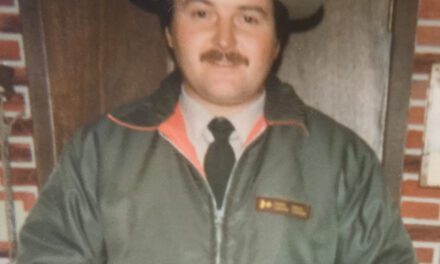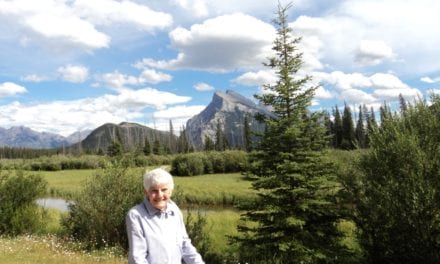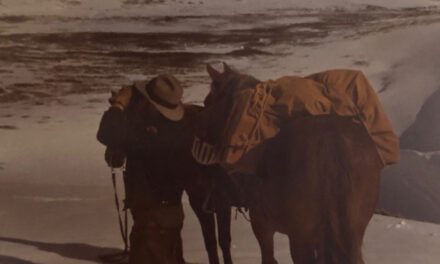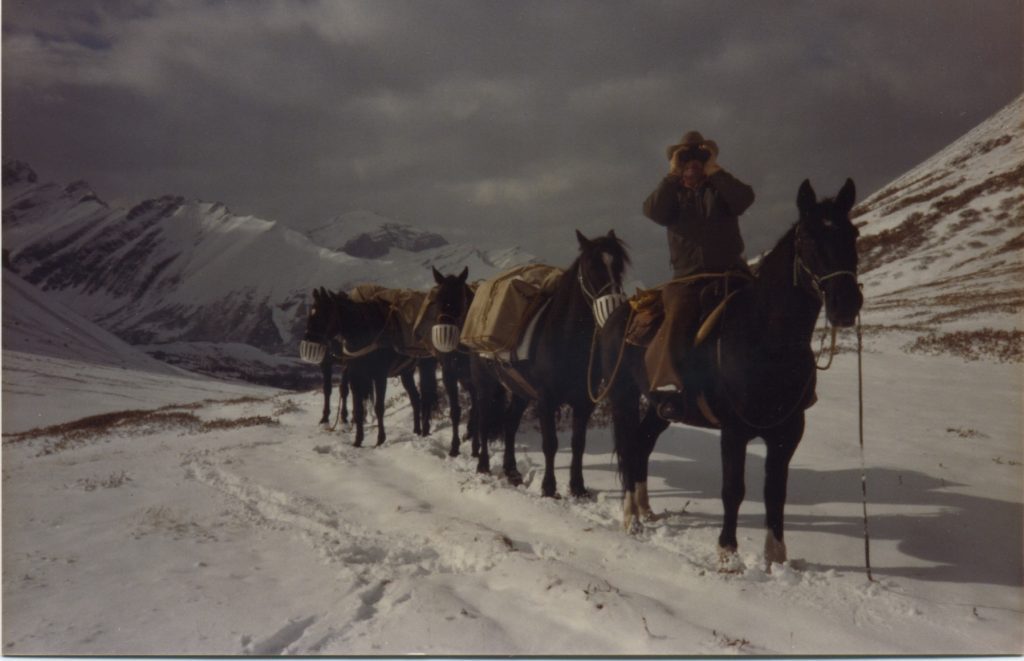
Don on boundary patrol in Jasper National Park.
MD: What did you like about being a warden? What didn’t you like about being a Warden?
Don: What I liked was the independence the job allowed. Basically, you were on your own.
What I didn’t like was how stingy the Parks were at that time. Instead of buying good riding horses, they bought plough horses. I also had to buy my own funnel for pouring, while assigned boat patrol on Clear Lake. While on night patrol on (the highway), I had to buy my own red wand for my flashlight. (These were) items that cost only 50 cents.
MD: What are some of the more memorable events of your Warden Service career?
Don: I was out one time on truck patrol inside the Park (Riding Mountain), and I was following this wagon into the fire area, and I came to this meadow, and the guy was going across the meadow, so I started following him, and all of a sudden I dropped down into the peat moss, and then next thing I know, my back tire caught on fire! (This occurred in one of the fire areas, where it was still burning in the peat). Fortunately, I had a thermos of coffee, and I managed to put it out. I could have burnt the truck up quite easily. Also, I had a rifle put on me twice, and told to get lost. And you’re out on patrol by yourself most of the time, so like I said, the fine is only $500, so you’re not going to get shot and killed over 500 bucks. The thing you did was look for scars or a tattoo, or something that’s distinct to the individual, and then we’d go and search the area with the RCMP. Even when I was on patrol, during the elk season, before we started ours, you could go out on horseback, but we didn’t go until early in the morning until it was really light, because they’d come over a hill on the boundary, and there’s 6 or 7 guys pointing a rifle at you. And yet the cleared boundary area itself was inside the Park, but we never did anything for people walking on the Park boundary itself. It would have been very difficult for them to stay outside of the cleared boundary area – though legally they were inside the Park.
I won’t tell you the guy’s name, but the first two years when I was at Riding Mountain, we stayed in a one-room tower cabin, my wife and I, in the summertime. And in the winter, we had to move out of the Park to a winterized tourist cabin. And this one guy was next to us, and we got to be quite friendly. Then when the elk season was on that we were doing in the Park, I got up in the morning and I heard rifle shot down on the boundary. Anyway, I went down to the compound, and I said, “Before we go out to hunt some elk, Iet’s take a look down the boundary from where I was living.” So we did that, and anyway, didn’t see anything – like the elk tracks that were going into the Park – they were so wide and so hard packed, anybody could walk in and you’d never see a person’s track. Anyway, because I was a good Joe, I got this guy a Towerman’s job, and then I finally got him on the Warden Service, and he became a really good warden. And his son is even a warden right now in Riding Mountain NP, and he started out in Prince Albert. When he retired, a tractor rolled over on him and killed him. His son was out at the Forestry School at Hinton, and I had to go out there and give them a bit of a speech, and afterwards I was talking to him, and I said, “Did you know that I almost caught your father poaching?” And his eyes popped out! (laughs) But anyway, he (Gordon Bergeson) told me about it afterwards – he said we came down the line with the Bombardier, and he heard us coming, so he stepped behind a big spruce inside the park, until we had gone past. Then he crossed back out of the park. But he had shot and wounded an animal, and followed it a little ways in. He’s passed away, but we’re still friends with his wife. She still lives on a farm just outside of Riding Mountain National Park. In fact, she was here in Chilliwack about three weeks ago. And I met another warden – the first Chief Warden I worked for was Joe Allen, and his son Calvin was here with his two daughters. They were curling in the Seniors Curling. But I didn’t know he was going to be there, but there he was, big as life – Calvin Allen. He’s retired now too.
Before being transferred out to look after the fires, we had early snowfall the winter before on September 12th that amounted to 1 ½ feet of snow. The local farmers still had crops in the field, and the elk from the Park were making a mess. The province put on a hunting season outside the Park, and I was put in charge of a hunting season inside the Park, done for PR reasons, I guess. The result was that we shot over six hundred elk, and I never went big game (hunting) for the rest of my life.
MD: How did they (Parks) rationalize the slaughter of 600 elk, when they were going after poachers for just one elk?
Don: Well, I was in charge of it, and I was the only warden working on it. The rest were Park employees. We had three of us doing the shooting from the Bombardier, and then we had a one-ton truck with a driver, and two Indians for skinning the elk.
MD: Where did the elk meat go?
Don: The Indians got it all. If you wanted a roast or a steak, you had to go to the local bar. (laughs) They got all the hides and everything. They got even the heads if they wanted them.
MD: Can you tell me about any rescue/wildlife/enforcement stories that stick out in your memory?
Don: This was the biggest poaching case in National Park history. An individual from San Francisco poached a bull elk in Banff, and a large bighorn sheep in Jasper at the Icefields. Banff Wardens conducted a search of a BC outfitter where they seized a camera with film in it. Upon developing the film, the person from San Francisco was seen feeding the bighorn sheep at the Icefields, which he later shot. We were able to place that sheep and he and his partners at the Icefields, because of the identifiable mountains in the background. (The other aspect of getting a prosecution in this case was that by using the techniques we developed in Jasper, we could prove that the animal came from Jasper National Park. I believe these techniques are not being followed anymore.) By this time, he was back in the US, and claimed the sheep was shot in the guide’s hunting area. However, I assigned one of my staff to go to San Francisco, and contacted the US Fish and Wildlife to assist with the investigation. Fortunately, the US has an Act, called the Lacey Act which allows them to prosecute any American breaking wildlife laws anywhere in the world. He was fined $12,000, had to do community service time up to 600 hours, and was banned from hunting anywhere in the world for 5 years. The most we could have done was a $500 fine). (The Lacey Act is a conservation law in the U.S. that prohibits trade in wildlife, fish and plants that have been illegally taken, possessed, transported or sold.)
MD: I have a question about that big poaching case in Jasper – the biggest poaching case in National Park history. Is that correct that the most parks could have got was a $500 fine?
Don: That’s what the fine was for any offence in the National Park – the maximum fine. That was when Parks were established in 1933. And it didn’t change until just before I left Parks. We caught a few other people the same way, but they were just people passing through the Park and took the opportunity. Yes, it’s the Lacey Act. It’s a good one – pretty powerful!
MD: How did the Warden Service change over the years?
Don: Well, what I did – I saw the writing on the wall. People, in order to go to court and do other stuff, they had to be expert in their field, and we were generalists at the time. And it’s very difficult in that day and age, that anybody could keep up in all three areas. There were a few guys, but not everybody. So what I did – I assigned people to Law Enforcement – 80% of the time they’d be doing nothing but law enforcement, and the same with the other areas, and the other 20%, they would help the other fellas. But what they’ve done now, they’ve gone 100% the other way. If you’re law enforcement, that’s all you do – nothing else but. And the same with Resource Management or Public Safety. And personally, I think they went too far. For an example, they’ve got about 5 or 6 guys in Jasper with Forestry degrees in Fire Management. Well, you don’t need 5 or 6 guys in Jasper in Fire Management – one would have been enough. And the other thing is in the Public Safety, I envisioned that it would be good to establish two or three teams in the National Parks for Search and Rescue, but they just went 100% for everybody, and that’s what they did. We worked that way for a number of years (the 80%) before it happened. And I could see the writing on the wall, and as you go to court, you’ve got to know what you’re doing, and not be a clown. And the only way you can do it is to gain the experience, and so you’ve got to work in that area to gain it, and have training in those areas. For an example, I sent two guys to Edmonton to the RCMP, and they trained them as firearms instructors, so any new staff we got, they had to pass firearms tests, and if they didn’t pass it, I just advised Region that “No, you can’t hire him here – he’s got to go back to Region, you find a job for him.”
MD: What about the Warden Service was important to you?
Don: One of the things I was brought to Jasper for was to instil pride in the staff. Some of the staff were wandering around in half-dressed uniforms, and so I became a stickler for full dress uniforms, often sending them home to come back fully dressed as they should be. You don’t get the respect of the public dressed as a farmer! I also had to instil in them what they were there for, mainly to serve the public and enforce the regulations with common sense, and by being polite.
I started a get-together of Wardens for Western National Parks in the fall (Warden Days) where we all got together and competed against each other. This lasted over 20 years and continued even after I retired.
MD: Are there any legends or stories associated with the Warden Service that you can share? Is there anyone that stands out in your mind?
Don: I shouldn’t tell you this (story), but the first winter I was there, I was on night patrol on the highway, and as a young man I used to fall asleep at the wheel. So consequently, I’d wake up with the truck in the ditch! And it was a good thing there was a lot of snow. But other times, I’d be parked on a side road or something, just facing the main highway so I could flag down anybody that came along, but one of my friends from the north side of the park came along – they opened the door, and I just fell out because I was sound asleep! (laughs) Anyway that only occurred in my early years. But there was other things (at Riding Mountain) – one of my friends, Gordon Bergeson – he was out on patrol, and he found where poachers had put their guns and sleeping bags and stuff in plastic bags and hauled them up into a tree. So then he got a hold of a few of the other wardens, and they went and camped out, because they figured these guys would be coming back. They came back that night, and took everything without their knowledge! The wardens just kept really quiet, and you couldn’t get too close to the spot, otherwise it would give them away. But, they got everything. These guys got up in the morning and went to check, and it was all gone.
MD: Is there anything about the Warden Service, as you knew it, that you would want future generations to know?
Don: Yes, I would like them to know that it wasn’t just a job, but a way of life. It was nothing to put in 300 hours a month, and your wife was always helping by running the weather station or working as a fire tower person.
MD: Do you have any lasting memories as a Warden?
Don: I’ll only mention one item, and that is my horse “Slim”. When the RCMP closed down Fort Walsh and their horse breeding program, some of their horses were given to Western National Parks like Riding Mountain, Prince Albert, and Elk Island. Slim was 17 ½ hands tall, a big horse. The first winter, I took out the seat of my pants 3 times, but he was a beauty to ride. You could go all day, and never know that you had been on a horse all day. (can add more on the phone interview)
MD: I haven’t met you in person – are you a tall guy?
Don: No! I’m about 5’6! You’d just put (Slim) in a slow lope, and cover 10 -15 miles in an hour, no problem – a beautiful horse. Actually, when I left to go to Georgian Bay, Calvin Allen ended up with him. He was a nice big horse and a pleasure to ride.
MD: Do you ever miss being a warden?
Don: No, not the way it is now.
MD: Do you have any photos of yourself as a warden that you would like to donate, or any artefacts or memorabilia?
Don: I have some photos and an article by Bill Overend.
MD: What year did you retire? What do you enjoy doing in retirement?
Don: I retired in 1991. When my son passed away from cancer, I took over his two children, and my wife and I raised them for 8 years. I went back to work for Alberta Parks at William A. Switzer Provincial Park for 4 years. When they went to contract, I hired on as a Grader Operator for Inland Highways, plowing the road to the coal mines at Hinton, Alberta, and plowing the sides of Highway 16 halfway to Edson, to the Jasper East Gate, and half way to Grand Cache.
MD: Is there anything I haven’t asked you that you think I should know about the Warden Service?
MD: Is there anything else you think I should know about the Warden Service, ie. anything you’d like future generations to know?
Don: Riding Mountain and Prince Albert were probably two of the most poached parks in the system. A lot of parks like Point Pelee and whatnot, they didn’t get any poaching, and if they did, it was very mild. But in Riding Mountain and Prince Albert, it went on all year round, for meat. And Jasper was mostly for trophy animals, not for the meat. Banff did have a big sheep, and it was the world’s record. It disappeared. They covered the whole area where the sheep stayed in the park, and they never did find it. Then the US Fish and Wildlife said there was a criminal in Chicago that offered $100,000 to anybody that would deliver it to him. But it was only hearsay, so we don’t know what really did happen to it. Actually, that’s what’s happened now though, and the Park’s not aware of it. But the people I dealt with in Ottawa, and even in the Regional Office – a lot of them didn’t have a clue. They always figure we’re just dealing with tourists – that’s all. Well, that’s true – it was the bulk that we dealt with were tourists, but that 1% was what gave us the real headaches. The funny (or sad) part about it was – because we were peace officers, we were entitled to carry side arms. The Parks wouldn’t allow it as part of the uniform, so the guys always carried shoulder holsters with their gun. I figured maybe 80% of the wardens in Jasper had a sidearm. But I wasn’t allowed to train them in its use. I always worried because I figured somebody might get into trouble accidentally, and they’d throw the book at him. That’s the sad part about it, but now the guys in Law Enforcement are armed, but there’s not enough of them – is the problem right now.
MD: And you retired before that whole law enforcement issue blew up?
Don: Yes, I was retired.
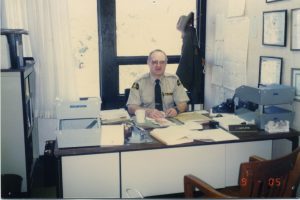
MD: Is there anybody else that you worked with that you think we should interview for this project?
Most of the guys are retired – I don’t know where they are, half of them. Or they’ve passed away, one or the other. Like Gerry Campbell, I mentioned in Penticton, he was one of my Chief Wardens at Riding Mountain, but he’s 86 now. His wife, the one that he’s with now, she’s in an Assisted Living home. He has a hard time even talking now.
I think somebody else interviewed Mr. Campbell and he’s in Penticton right now. (Gerry Campbell has been interviewed). And then there was Jimmy Sime – he was one of my Chief Wardens at Riding Mountain, and he was a good man too. Have you interviewed Alfie Burstrom? Yes, he did pass away –I just found out about it. He was my dog master when I was at Jasper. He had sons – one went into the RCMP, and one started as a seasonal warden in Jasper with me, and then when he got on permanent, he went to Banff. All of them are very good working with leather and with wood carving.
MD: Probably one of them was Frank Burstrom.
Don: Yes, it was Frank. Anyway, when I retired, he carved for me – it’s last one he carved – there’s a replica of the warden’s badge, but it’s about – I’m looking at it on the wall here, about two feet high, and a foot and a half wide. And it’s all hand-carved, and it took him over three hundred hours.
MD: I think I’ve seen one of those. I think Keith Everts got one of those too – a beautiful carved warden badge.
Don: Well, he only made about 6 or 7 of them, that’s all. He might have got back into it again, after I retired, I don’t know. But he (Frank) swore up and down that was going to be his last one. His dad had bought an acreage at Valemount, and even after I retired, whenever I was going to Edmonton or anything, we always stopped and stayed overnight with them there. But his wife was quite handy that way, and I guess that’s where the boys picked it up. But (Alfie) had a lisp, and anybody he didn’t know, it was kind of hard for him to talk. But with a dog, no problem whatsoever. Even after he got to know you, he could eventually talk to you, not too bad.
My wife worked for a self-help outfit, and there was a guy passing through with the circus, and an American. So he decided to go to the bar, and he went with these railroaders that went to Red Pass in BC, and of course they were all three sheets to the wind, and they almost ended up in the Fraser River. They went off the road, and down the bank, and almost to the river. So he lost his wallet and everything, so he was broke. So when he got out of the hospital, Phyllis asked me if I could give him a ride over to Valemount to pick up his packsack where they had towed the car to. And we had a look for it where the accident had happened, but it was all broken battery, and glass, and bits and pieces of car. So we picked up his pack, and came home, and I said, “Well, look, (this was a Saturday), when my dog master is in on Monday, I’ll send him over to see if we can find your wallet.” So I called Alfie in on Monday morning, explained it to him, and away he goes with the dog. He’s back before 10 o’clock and throws the wallet on my desk. And it was buried under a foot of shale, and all this busted pieces of glass, and battery acid, and all that stuff, and the dog still found it. He was amazing – that dog. Alfie was the first one to have a dog, and we used to send him down every year to Innisfail for training with the RCMP. And the only thing we didn’t train them for was attack. That wasn’t in our vocabulary for that. But he would beat all of the all the other RCMP dogs – he’d beat them every time. The dog’s name was Ginger – he was part coyote and part German Shepherd. (Alfie Burstrom, together with his dog Gypsy, was the first certified avalanche dog handler in North America.)
There was one other thing I should mention. When I started work with the Warden Service, everybody told me, “Well, you’ve got a job for life there. No civil servants get fired.” And that’s a lie, because I fired a guy. And the union wouldn’t even stand up for him, because I made sure I crossed all my T’s and everything. It takes time and you’ve got to do it the right way and everything, but it was quite possible. That was in Jasper. We had problems ahead of time – there was a guy who used to be a bank manager in Jasper, and then he bought a restaurant on the Parkway. And part of the deal was that he had to put a new sewer system in. Unfortunately, the warden that I had down the Parkway at the time was friendly with this guy. So we called him in, and laid down the rules, what we wanted done and everything, and then I assigned a more senior warden to keep an eye on him over the holidays. And sure enough, they didn’t follow the regulations, and then they covered it all up, so that once the long weekend was over, you would never know. But we had somebody watching, and we proved it. And we talked to this guy that we fired – we had him in, his boss and myself, and we talked to him about – that they had to keep a close eye on this guy, because he was shady. But we made him fully aware of what we wanted, so…but he didn’t keep an eye on the guy, just let him do what he wanted. So we ended up firing him, and normally the union would get involved, but when they saw what we had, they just said, no, we’re not going to bat for him. I didn’t enjoy doing it, because the guy lost the job, but he was young enough to start another career. He went and bought a boat at the coast, and rented it out.
MD: Were there any other stories you wanted to share before we close off here?
Don: Oh, just funny little things – when I was with the Forest Service, they sent me down to the Maritime Forest Ranger School, and there was four of us from Manitoba. We took a football down with us, and they didn’t have a clue what it was! Because there was no football played in the Maritimes at that time. And then when I ended up with National Parks, Parks sent me back to the Forest Ranger School to take Wildlife Management, and then they sent me back again to take Park Management. And the Director, the third time, he looked at me, and said, “What the hell are YOU doing here?!” I said, “Oh, they keep sending me here!” When I was at Riding Mountain, I came to Jasper for quite a few mountaineering schools and general training schools.
The only thing I would say, from the 1970’s into the 1990’s or late 80’s, that was the best time in the Warden Service – for everybody that I know, anyway.
MD: Thank you very much, Don.
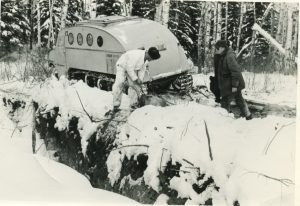
Don Dumpleton and Gordon Bergeson, Riding Mtn. National Park
During the Bison Reduction Program.
